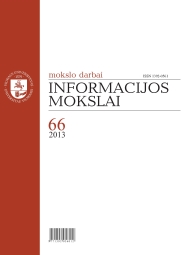Aukščiausio lygio vadovų komandų vaidmuo ir poveikis organizacijų veiklai žiniomis grindžiamos visuomenės iššūkių kontekste
THE ROLE AND IMPACT OF TOP MANAGEMENT TEAMS ON ORGANIZATIONS PERFORMANCE IN THE CONTEXT OF KNOWLEDGE-BASED SOCIETY
Author(s): Albinas Marčinskas, Vadimas DiskaSubject(s): Education
Published by: Vilniaus Universiteto Leidykla
Summary/Abstract: The most important issue in the article is how companies, because of great complexity and rather vague environmental conditions, knowledge-based society challenges, in order to stick to their position and gain competitive advantage, must be able to anticipate and react timely to external and internal environmental pressure and show an initiative to undergo changes. The nature of the organization’s reaction and efficiency depends on the top management team characteristics, structure, and potency. The article analyzes the conception of top management teams, their particularity, and the role they play in the organization. It is stressed that considering the role and importance of top management team in an organization, the scientists of strategic management and other fields much attention devote to their performance investigation. In their opinion, the organization’s top management team greatly impacts strategic trends and, therefore, is one of the main strategic resources (Castanias, Helfat, 1991; Michel, Hambrick, 1992; Finkelstein, Hambrick, 1996; Certo et al. 2006). The article stresses that the investigations of top management teams greatly developed in the 80’s of the last century; they were based on the “upper echelon“ theorical concept which illustrated different top management team aspects in the context of structure, decision making, and performance. In the previous “upper echelon“ investigations, while analysing the possible links between a top management team demographic characteristics and different organization results, the organizational demography approach prevailed. The performed investigations confirm the existing link between top management teams and organizational performance which is very important under conditions of rapid environmental changes. The article presents the main trends revealed in the scientific literature on the top management teams: team resources, team processes, managing team performance, and personal integration into the task. Therefore, it is important to have a better understanding of how top management teams impact organizational performance, not only to indentify the demographic indexes, but also to evaluate team and individual processes which function in top management teams. The investigation review has revealed that top management teams impact the research which was based on the “upper echelon“ theoretical concept, from the internal organizational level transcending to branch, country, international levels and encompassing different types of organizations – both in business and public sectors, and also organizations that are in different life cycle stages. On the basis of accomplished analysis, new problematic aspects of TMT have been revealed, which require more research.
Journal: Informacijos mokslai
- Issue Year: 2013
- Issue No: 66
- Page Range: 64-77
- Page Count: 14
- Language: Lithuanian

